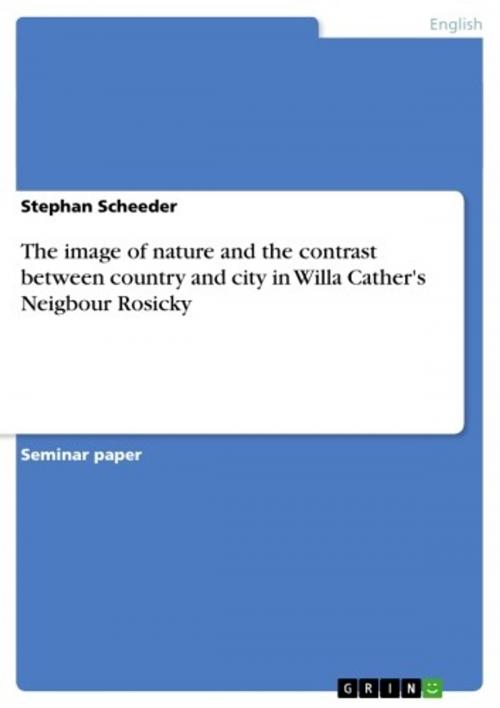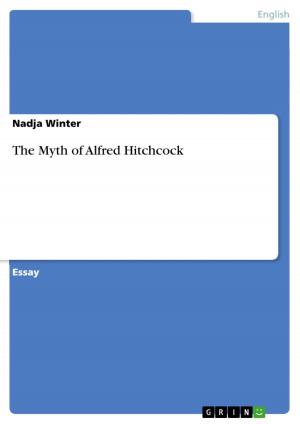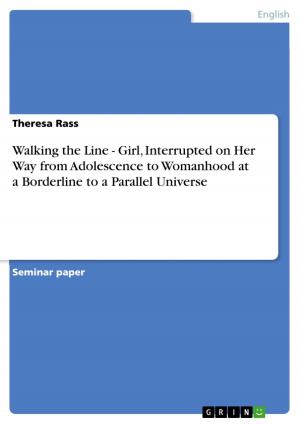The image of nature and the contrast between country and city in Willa Cather's Neigbour Rosicky
Nonfiction, Entertainment, Drama, Anthologies| Author: | Stephan Scheeder | ISBN: | 9783638149877 |
| Publisher: | GRIN Publishing | Publication: | October 26, 2002 |
| Imprint: | GRIN Publishing | Language: | English |
| Author: | Stephan Scheeder |
| ISBN: | 9783638149877 |
| Publisher: | GRIN Publishing |
| Publication: | October 26, 2002 |
| Imprint: | GRIN Publishing |
| Language: | English |
Seminar paper from the year 2001 in the subject American Studies - Literature, grade: 2+ (B), Free University of Berlin (John F. Kennedy Institute), course: American Short Stories, 3 entries in the bibliography, language: English, abstract: Bibliography: page 15 In the short story 'Neighbour Rosicky' the author Willa Cather tells the tale of the old czech farmer Anton Rosicky and his family. Cather describes Rosicky's present life as well as his past which is presented in several flash back scenes and in form of a narrative told by old Rosicky himself. One of the central motives in the story is the image of nature. It is embedded in descriptions of the Nebraska country, which Cather depicts very enthusiastically. However, the picture of nature and country is presented in various ways with the help of different techniques. One of the goals of this paper is to examine Cather's use of stylistic devices and that of her images and metaphors. Cather also strives to give the reader a very certain picture of the country itself and of country life. Again Willa Cather tries to employ different ways of presenting this picture. The picture nature and country, throughout the entire short story, is set against the contrasting image of the city and it's inhabitants and is ultimately the dominating contrast of the story since it best describes Cather's own thoughts on the topic, as well as conveying her message to the reader. The first indication of an image of nature is given very early in the story in the description of Rosicky himself. He is described as having a 'naturally high forehead'1 and his physical appearance is generally defined 'through the use of earth tones'2 such as his brown creased face with a ruddy color or his long brown mustache3. Dr. Ed Burleigh also notices that Rosicky's children have 'natural good manners.'4 This introduction of the imagery of nature as quoted above is very subtle. The main character Rosicky, who combines the attributes of nature within himself or his family, is introduced in a very likable and sympathetic way from the very beginning of the story. Therefore the reader is unconsciously presented with a positive point of view of nature. Also, the ability of nature to improve human appearance is highlighted when Mary Rosicky puts one of her dark flowers into Ed Burleigh's buttonhole. [...]
Seminar paper from the year 2001 in the subject American Studies - Literature, grade: 2+ (B), Free University of Berlin (John F. Kennedy Institute), course: American Short Stories, 3 entries in the bibliography, language: English, abstract: Bibliography: page 15 In the short story 'Neighbour Rosicky' the author Willa Cather tells the tale of the old czech farmer Anton Rosicky and his family. Cather describes Rosicky's present life as well as his past which is presented in several flash back scenes and in form of a narrative told by old Rosicky himself. One of the central motives in the story is the image of nature. It is embedded in descriptions of the Nebraska country, which Cather depicts very enthusiastically. However, the picture of nature and country is presented in various ways with the help of different techniques. One of the goals of this paper is to examine Cather's use of stylistic devices and that of her images and metaphors. Cather also strives to give the reader a very certain picture of the country itself and of country life. Again Willa Cather tries to employ different ways of presenting this picture. The picture nature and country, throughout the entire short story, is set against the contrasting image of the city and it's inhabitants and is ultimately the dominating contrast of the story since it best describes Cather's own thoughts on the topic, as well as conveying her message to the reader. The first indication of an image of nature is given very early in the story in the description of Rosicky himself. He is described as having a 'naturally high forehead'1 and his physical appearance is generally defined 'through the use of earth tones'2 such as his brown creased face with a ruddy color or his long brown mustache3. Dr. Ed Burleigh also notices that Rosicky's children have 'natural good manners.'4 This introduction of the imagery of nature as quoted above is very subtle. The main character Rosicky, who combines the attributes of nature within himself or his family, is introduced in a very likable and sympathetic way from the very beginning of the story. Therefore the reader is unconsciously presented with a positive point of view of nature. Also, the ability of nature to improve human appearance is highlighted when Mary Rosicky puts one of her dark flowers into Ed Burleigh's buttonhole. [...]















